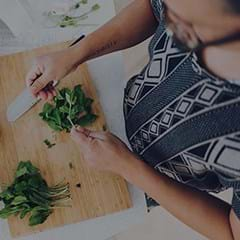We all know a good meal can change our mood for the better, but Rachel Kelly takes food and mood a step further. For years she sought medical treatment for severe depression and anxiety. And then she turned to her kitchen cupboards for help.
She now runs workshops with the mental health charity Mind, and shares recipes that have worked for her in a book, The Happy Kitchen.
She now runs workshops with MIND, a mental health charity in the UK, and shares recipes that have worked for her in a book The Happy Kitchen.
This interview comes courtesy of Radio New Zealand.
Kelly suffered a depressive episode in 1997 while she was working as a journalist at the Times newspaper in London. She recalls being unable to sleep one night, and says there were alarming physical symptoms that came with it.
“I felt like I had to be sick, I felt like I was falling and the symptoms got worse and worse, I couldn’t sleep and after three days and three nights I found myself in hospital and it was the start of a major depressive episode.”
She eventually got better and returned to work before suffering second episode. This time she was ill for a couple of years. “It was then that I decided to really research and discover, and really acknowledge this thing called mental illness. It’s a good thing to talk about it. It helps to reduce stigma and it helps people to talk and feel listened to, and to acknowledge what’s happening to them.”
She was given medication and therapy to help – “the two sort of standard treatments” – but experienced side effects, including weight gain. While medication has improved and now has fewer side effects, she says it will be more effective if used in tandem with lifestyle changes, such as improved nutrition and mindfulness exercises.
Her GP suggested the idea of “happy foods”, which she says was a light-bulb moment.
Teaming up with a nutritional therapist, Alice Macintosh (also her co-author), she looked at over 150 pieces of nutrition research. “Sixty percent of our brain is made of fat, and we need much more of the right kinds of healthy fat – most people have too much of the omega 6s and need more of the omega 3s.”
She says eating differently can have an impact on the brain in as little as one day, and there are plenty of studies that show gut health can change in four or five days. By comparison, “the best antidepressants can take a couple of weeks or more to kick in.”
Kelly says the book doesn’t rule anything out, but recommends variety. “Get your protein from a variety of sources – so yes, get some from meat, fantastic. But get it from lentils, get it from beans, get it from fish, get it from a whole variety of sources, because your stomach loves that and so does your brain.”

This content is published under licence and in partnership with Radio New Zealand, one of the world’s foremost public broadcasters. To learn more go to radionz.co.nz








